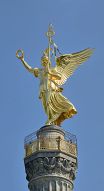What characteristics and behavior are best in a leader? Namely, how can a leader achieve a prosperous economy, remain at peace, and stay in power, among other things, while simultaneously retaining control over his or her people? From ruthless oppression and persecution to warm charisma and compassion, different leaders have employed disparate tactics and methods for treating their subjects to varying results.
However, there exists a correct answer to this political dilemma. Niccolò Machiavelli claims in The Prince that, “[For a leader] it is much safer to be feared than loved because…love is preserved by the link of obligation which, owning to the baseness of men, is broken at every opportunity for their advantage; but fear preserves you by a dread of punishment which never falls.” Although now several centuries later, I believe that Machiavelli’s claim still holds true in modern nations, even in the United States. Barack Obama, a leader indubitably more liked than feared by his citizens, evidences Machiavelli’s assertion through his own failings and struggles as president.
Except for the few radical thinkers who obstinately believe Obama is a Kenyan terrorist out to destroy the United States, it is safe to assume that American citizens, in general, do not fear Obama. The fear of which Machiavelli writes is based off of citizens’ “dread of punishment”— that is, the people must tremble at the horrific consequences certain to ensure should they step one foot out of line. However, in a democratic republic where the Bill of Rights protects citizens from unfair government and rule, including the practice of cruel and unusual punishment, there is no punishment to dread, and, therefore, no fear is present. Not only that, but in contrast to some of his predecessors, the president is characterized by his reluctance and, arguably, pusillanimity in dealing with difficult issues – such as foreign policy – making citizens even less afraid of him.
Therefore, Obama is loved, or at least more loved than feared, by Americans. To be “loved,” according to Machiavelli, means that citizens’ “obligation…is broken at every opportunity for their advantage.” When citizens no longer feel horror at the thought of their punishment, they come to realize that they can act however they may choose—meaning that they may exploit the ruler. Since Obama does not have a “fear factor,” he has lost some of his reverence as president, and some citizens even take advantage of him as well. Currently, Obama is failing to lead the country: he is powerless in efforts to reconcile the intractable Congress, his “Obamacare” is not positively affecting a sizable number of Americans, and he is getting attacked by Democrats and Republicans alike (his approval ratings have never been lower). Everyone feels as though they can walk all over him without consequence; the supposed “love” means nothing. Is it truly better to be feared or loved? You tell me.

I both agree and disagree with this post. For starters, Obama’s indecisiveness about foreign policy and his reluctance to deal with political issues does not make him loved by the American people, it makes him hated. According to Machiavelli, being hated is the worst thing to be, so Obama is not succeeding at all. Also, the three governmental branches are put in place so that one person cannot have all of the power. Obama could not be feared even if he tried. The entire US government would have to all of a sudden agree to imprison people who run red lights, not just Obama. While Machiavellian ideals are used in politics today, you cannot compare the subject of a prince to the leader of the free world.
LikeLike